
Do I Contact Insurance First or Contact A Roofing Company?
January 23, 2025 — Homeowner insights | Insurance insights
Making decisions about your home can feel daunting, especially when you have questions about damage and repairs. The best way to navigate these critical choices is by arming yourself with knowledge—it’s a powerful first step in making informed, confident decisions. If faced with roofing damage, you may be wondering, do I contact insurance first or contact a roofing company?
You should always contact your insurance company first. Your insurance company will guide you through the claims process, arrange for an adjuster to assess the damage, and help you avoid unauthorized or unnecessary repairs that could complicate your claim. They may even recommend trusted roofing contractors to handle the repairs.
Here’s a breakdown of how roof insurance claims work and five key reasons why reaching out to your insurance company first is essential.
HOW DO ROOF INSURANCE CLAIMS WORK?
A roof insurance claim process follows the same steps as filing a claim for any other covered perils under your homeowners insurance policy. Here are the steps in a standard insurance claim.
1. Stay Safe: If you experience damage to your home, your priority is to assess and maintain your safety.
2. Prevent Further Damage: Take any necessary steps to mitigate additional loss.
3. Contact Your Insurance Company: A representative will give you information about your deductibles and the claim process.
4. File Your Claim: Provide the necessary information to your insurance company to make your claim official.
5. Document Everything: Take pictures of damage before and after any emergency repairs. Make a list of the lost, damaged, or stolen items. Do not throw away damaged items or allow a contractor to remove them before your adjuster has completed the inspection.
6. Schedule Adjuster Visit: After you file a claim, your insurance company will assign an adjuster who will visit your home to evaluate the damage.
7. Receive Your Claim Settlement: When the inspection report is completed and reviewed by the insurance company, you’ll receive your claim settlement information and can get back to rebuilding your life.
You can take a deeper look at each step in the insurance claim process here: Take the Insurance Claim Process One Step at a Time.
SHOULD I CALL A ROOFER OR INSURANCE FIRST?
For a roofing claim, contacting your insurance company before a roofer is essential. Here are the five reasons you should call your insurance company first.
Your Insurance Company Can Help You Understand Your Coverage.
A roofing company does not know what coverage you have on your home insurance policy, the amount of your deductible, or any exclusions that may apply to your coverage. Contacting your insurance representative first ensures you have all the information you need when determining how to proceed with the work on your home.
Your Insurance Company Can Guide You Through the Claim Process.
The insurance company will walk you through how to document damage correctly, which ensures a smooth claims process. Additionally, after you file a claim, your insurance adjuster will need to assess the damage to determine coverage. Having a roofer make changes before this can complicate the evaluation and may affect your claim.
Your Insurance Company Can Provide Trusted Contractor Recommendations
Insurers often have preferred contractors or can recommend trusted roofers who are familiar with the claims process. This is called a managed repair program, which provides vetted contractors and also
streamlines the repair process. Using these recommended contractors can ensure quality work, avoid costly mistakes, and help prevent potential scams.
Your Insurance Company Can Tell You About Policy Enhancements.
Some insurance companies offer endorsements to upgrade your roof at the time of replacement. FORTIFIED is one example of this. FORTIFIED is an optional roofing system developed by the Insurance Institute for Business & Home Safety (IBHS) that exceeds standard building codes. Designed for new or reroofing projects, it can strengthen homes and businesses against weather events like high winds, hurricanes, hail, and storms. FORTIFIED can be applied to any roof type, including metal, tile, or shingles, to make your property more durable. While insurance provides essential protection against severe weather, upgrading to a FORTIFIED roof offers an added layer of defense, safeguarding your home or business against future damage and claims. Only your insurance company can provide this endorsement to your policy.
Your Insurance Company Can Arm You with Information to Avoid Bad Actors
Some roofing companies engage in unethical practices, such as pressuring homeowners into quick decisions, inflating damage for larger roof damage insurance claims, or offering to waive deductibles, which is often illegal. This is especially common after a widespread storm. In some cases, they may also perform poor-quality repairs or disappear after taking upfront payments. By contacting your insurance company first, you can avoid potential pitfalls and ensure your claim is processed as efficiently as possible.
SHOULD I FILE AN INSURANCE CLAIM FOR MY ROOF?
Whether or not you should file an insurance claim depends on several factors, including the extent and type of the damage, the cost of repairs, your deductible, and any policy limits. Filing a claim that gets denied can affect your premium and record. It’s best to consult your insurance company or agent to better understand your policy before submitting a claim. Here are some factors to consider when determining if you should file a roofing insurance claim.
Extent and Type of Damage: If the damage is significant (e.g., large areas of missing shingles, leaks, or structural issues), it’s likely worth filing a claim. Ensure your insurance policy covers the damage, as some damage, like normal wear and tear, may not be covered.
Cost of Repairs and Your Deductible: Compare the estimated repair costs with your deductible. If the repair costs are lower than the deductible, it probably doesn’t make sense to file a claim. Remember a deductible is outlined in your insurance policy and is the amount you are responsible for paying before your insurance kicks in. Higher deductibles mean more out-of-pocket expenses, so consider whether filing a claim will cover the costs of repairs after the deductible.
When you discover roof damage, contacting your insurance company first is a smart move. Your insurer can help you understand your policy, including coverage, deductibles, and potential exclusions, so you know what to expect before committing to repairs. They can also recommend trusted contractors through a managed repair program, ensuring high-quality work and protecting you from fraudulent operators. Starting with your insurance company arms you with the knowledge you need to make the best choices for protecting your most valuable asset.
